Facebook Unveils AI-Powered Smart Glasses

Meta has recently unveiled an innovative range of smart glasses powered by its advanced artificial intelligence (AI) technology. This announcement came during the annual developers conference, “Meta Connect,” where CEO Mark Zuckerberg expressed his confidence that these glasses would become a must-have accessory globally. The partnership with well-known brands like Ray-Ban and Oakley marks a significant expansion of Meta’s wearable technology offerings.
The showcase featured the Meta Ray-Ban Display, which includes a full-color, high-resolution screen in one of its lenses, allowing users to conduct video calls and view messages seamlessly. Additionally, the glasses are equipped with a 12-megapixel camera. At the event, Zuckerberg also introduced a neural wristband that syncs with the Ray-Ban Display, enabling users to perform tasks like sending messages through small hand gestures.
However, the introduction of this groundbreaking technology wasn’t without hiccups. During the demonstration, a WhatsApp call—also a Meta platform—failed to connect after several attempts, leading Zuckerberg to humorously express his frustration. Despite such technical difficulties, he remains optimistic about the potential of incorporating Meta’s AI into everyday life through these smart accessories.
Industry analysts speculate that Meta’s smart glasses could outperform its ambitious Metaverse project, as the glasses represent a more practical, everyday technology compared to virtual reality headsets. Mike Proulx, a Vice President at Forrester, emphasized that it’s crucial for Meta to persuade consumers of the glasses’ value to justify their cost, particularly as the Display is priced at $799, significantly higher than previous models.
In contrast, Leo Gebbie from CCS Insight expressed skepticism regarding the new models, asserting that the previously successful Ray-Bans gained popularity due to their easy usability and affordability. The company claims to have sold around two million pairs since entering the market in 2023. Newly introduced also were the Oakley Meta Vanguard smart glasses priced at $499, targeting sports enthusiasts, and an updated version of the Ray-Ban Meta glasses priced at $379.
Simultaneously, Meta is reinforcing its commitment to AI through a substantial investment in AI infrastructure and talent acquisition, intending to develop what it describes as “superintelligence.” However, the company is currently under scrutiny from advocates who have voiced concerns over the safety of minors on its social media platforms. Protests occurred at Meta’s New York headquarters, where activists demanded increased protections for children, particularly in light of testimonies alleging that the company had downplayed potential harms linked to its virtual reality products.
Amidst these controversies, it is clear that Meta sees AI-powered smart glasses as a significant step forward in technology and user engagement. However, its success will likely depend on effectively balancing innovation with the growing concerns surrounding user safety and product impact.